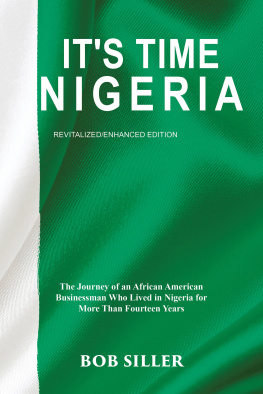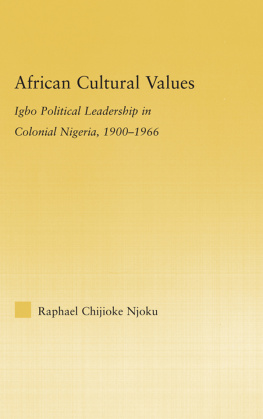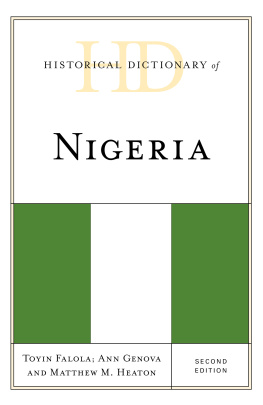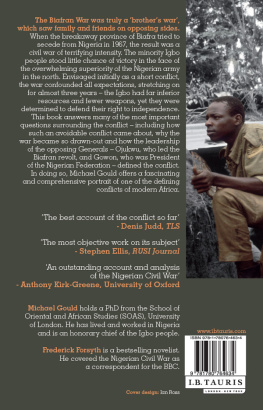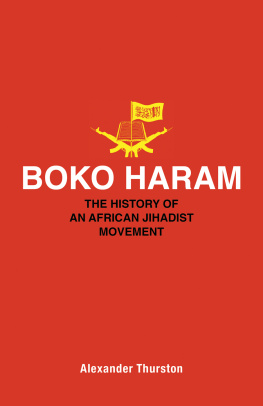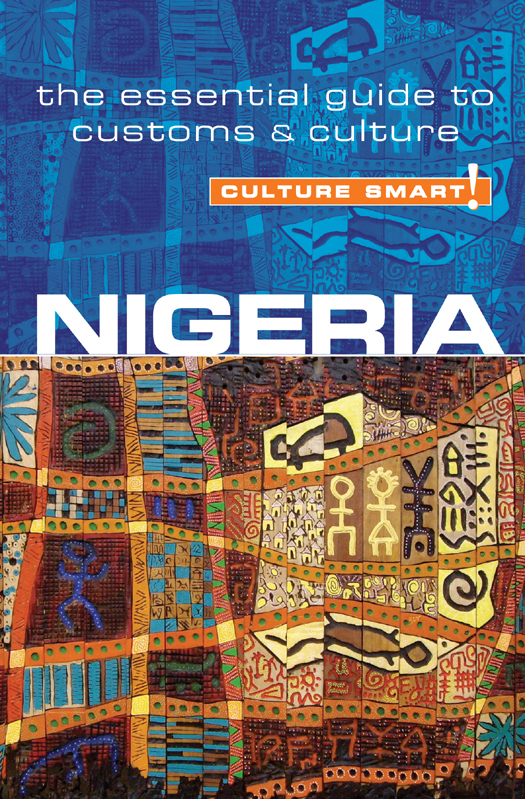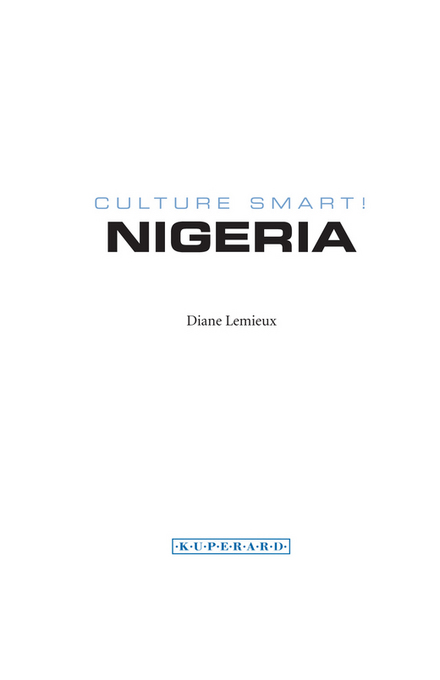eISBN: 978-1-85733-630-6
British Library Cataloguing in Publication Data
A CIP catalogue entry for this book is available from the British Library
Copyright 2011 Kuperard
All rights reserved. No part of this publication may be reprinted or reproduced, stored in a retrieval system, or transmitted in any form or by any means without prior permission in writing from the publishers.
Culture Smart! is a registered trademark of Bravo Ltd
First published in Great Britain 2011
by Kuperard, an imprint of Bravo Ltd
59 Hutton Grove, London N12 8DS
Tel: +44 (0) 20 8446 2440 Fax: +44 (0) 20 8446 2441
www.culturesmart.co.uk
Inquiries:
Series Editor Geoffrey Chesler
Cover image: The Unbreakable Nigerian Spirit (detail) by Gerald Chukwuma. Acrylic/relief on wood panels. From the collection of the African Artists Foundation (www.africanartists.org)
Images on the following pages reproduced under Creative Commons Attribution-Share Alike 3.0 Unported license: Ttzavaras.
Images reproduced under Creative Commons Attribution-Share Alike 2.0 Generic license: paulscott56.
The image on is from The National Archives UK @ Flickr Commons.
Photos on Fotolia.
v3.1
About the Author
DIANE LEMIEUX is a Canadian-Dutch writer and journalist currently based in Lagos. Born in Quebec into a diplomatic family, she has lived and worked in eight countries around the world. She has a BA in Communication from the University of Ottawa in Canada, an MA in Development Studies from Leeds University in the United Kingdom, a postgraduate degree in International Relations from Amsterdam University in the Netherlands, and a diploma in Journalism from Bath University in the UK. She has written several books and articles on topics in the fields of intercultural communication, national diversity, and expatriate issues, and now specializes in Nigerian cultural life.
The Culture Smart! series is continuing to expand. For further information and latest titles visit
www.culturesmart.co.uk
The publishers would like to thank CultureSmart!Consulting for its help in researching and developing the concept for this series.
CultureSmart!Consulting creates tailor-made seminars and consultancy programs to meet a wide range of corporate, public-sector, and individual needs. Whether delivering courses on multicultural team building in the USA, preparing Chinese engineers for a posting in Europe, training call-center staff in India, or raising the awareness of police forces to the needs of diverse ethnic communities, it provides essential, practical, and powerful skills worldwide to an increasingly international workforce.
For details, visit www.culturesmartconsulting.com
CultureSmart!Consulting and CultureSmart! guides have both contributed to and featured regularly in the weekly travel program Fast Track on BBC World TV.
contents
Map of Nigeria
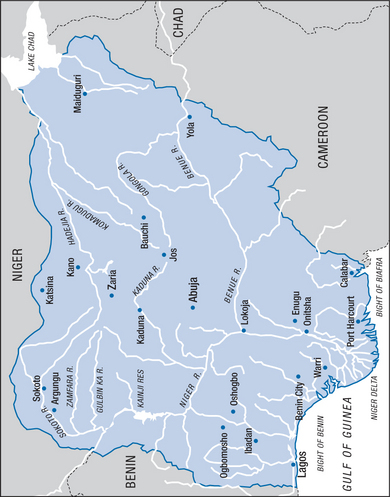
introduction
Nigeria is not, yet, a tourist destination. The potential is there. A large country, it has everything from sandy beaches and lush tropical jungles to fertile plains, beautiful mountains, and arid desertbut there is little tourism infrastructure. Most foreigners who visit the country do so purely for reasons of employment. Indeed, Nigerians themselves tend to travel within the country only for business reasons or to visit family. Few people take the time to appreciate the most exceptional aspect of Africas most populous country: the vibrancy and cultural sophistication of its people.
The sheer cultural variety to be found within Nigeria is impressive, with around two hundred and fifty distinct ethno-linguistic groups. That said, three large groups dominate the cultural and political scene. The culture of the mainly Muslim Hausa-Fulani in the north is rooted in the once opulent city-states of the famed trans-Saharan trade routes. The Yoruba culture of the southwest has given rise to some of Africas best-known art forms and has influenced religions and traditions in many countries through the out-migration of its people during the slave trade. Finally, the Igbo of the southeast have decentralized, republican traditions that have produced a culture of talented traders and businesspeople.
Competition for scarce resources during Nigerias short history as an independent nation has fostered ingenuity and perseverance on the part of its ambitious citizens. They are natural entrepreneurs, and intelligent and shrewd negotiators. They are also proud. Acutely aware that they have been considered second-class people by Westerners for more than two hundred years, they are deeply aggrieved by their countrys reputation for violence and corruption. Most are devout, gregarious, hardworking, and intensely critical of the culture of patronage and self-enrichment that grips much of the public sector.
Those who come to Nigeria to explore its economic potential cannot hope to be successful without the assistance of their Nigerian counterparts. Nigerians are not easy to get to know, however; their daily lives are extremely busy, with arduous commutes, long work hours, and many religious and family responsibilities. Furthermore, they are extremely sensitive to condescensionbut to those who show a genuine desire to understand their culture, they offer warm hospitality and steadfast cooperation.
This book provides a snapshot of Nigeria today, a brief introduction to the ancient and complex systems of behavior, values, and attitudes that underlie the countrys vibrant social and business life. It also opens the door to a fascinating culture that will undoubtedly play an increasingly important role in global affairs.
Key Facts
| Official Name | Federal Republic of Nigeria | Member of the OAU, OPEC, and the Commonwealth |
| Capital City | Abuja |
| Main Cities and Towns | Lagos, Kano, Calabar, Katsina, Port Harcourt, Enugu, Kaduna, Warri, Ibadan, Benin City, Jos, Zaria, Maiduguri, Bauchi |
| Area | 356,669 sq. miles (923,768 sq. km) | Divided into 36 states and 1 Federal Capital Territory |
| Terrain | Desert plains in the north, hills and plateaus in the middle belt, and tropical forests and a large delta basin in the south, along the coast |
| Climate | Varies from arid in the north to tropical in the center and equatorial in the south |
| Currency | Naira (N), divided into 100 kobo | USD1 = N117
GBP1 = N240
EUR1 = N220
(2011 est.) |
| Population | 150 million (est.) | Africas most populous country |
| Ethnic Makeup | There are more than 250 ethnic groups. The most populous and politically influential are Hausa and Fulani (29%), Yoruba (21%), Igbo (18%), Ijaw (10%), Kanuri (4%), Ibibio (3.5%), and Tiv (2.5%). |
|


